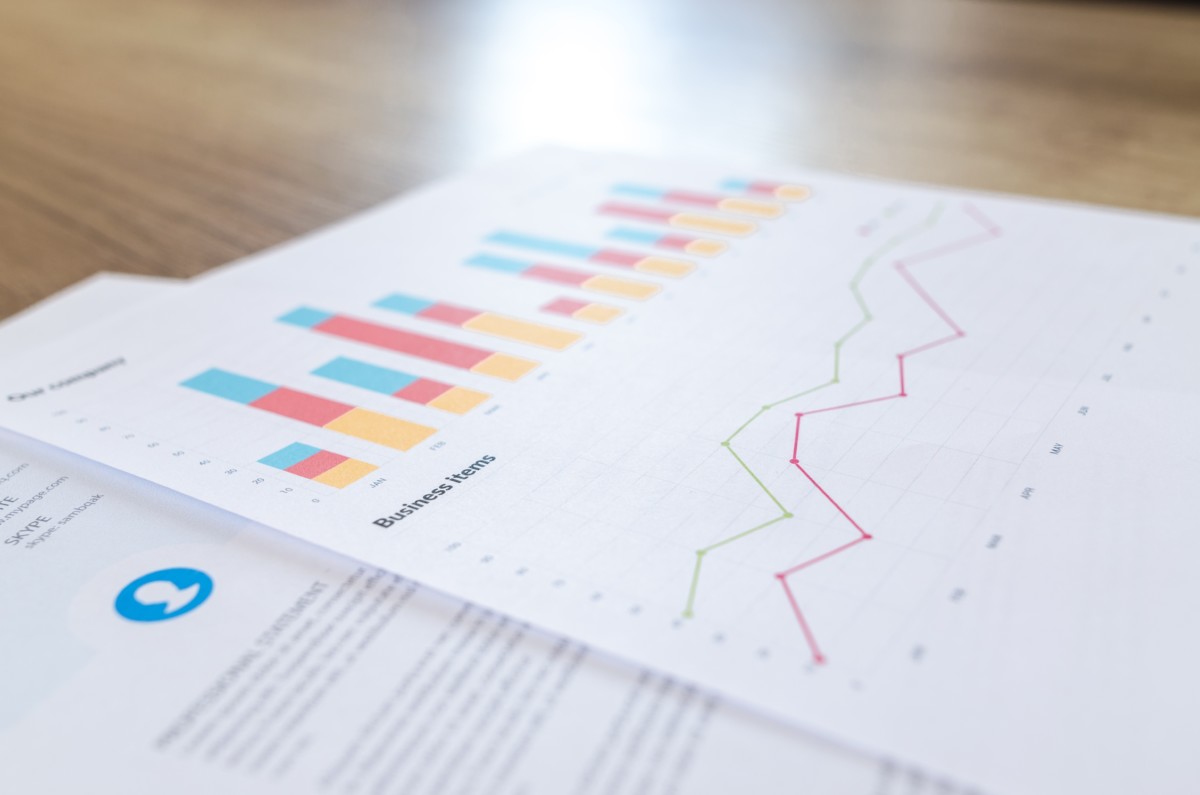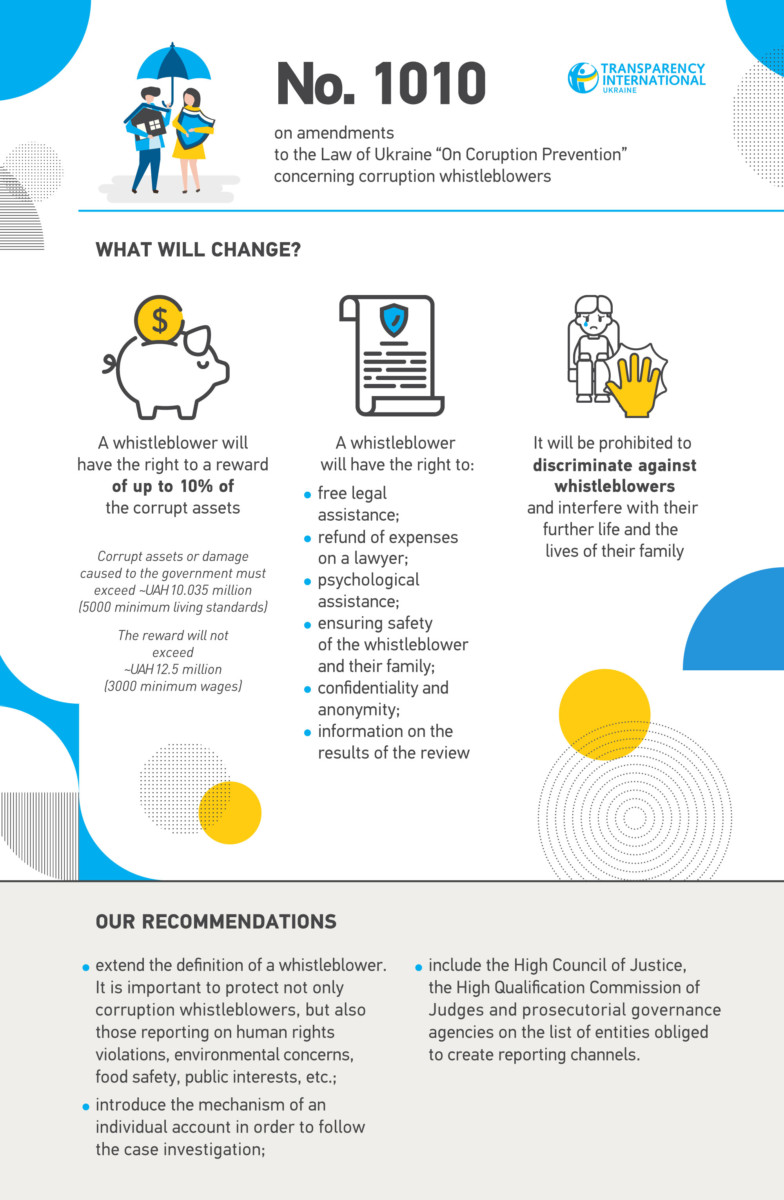

On 29 August 2019, the President submitted urgent draft law No. 1010 on amendments to the Law of Ukraine “On Corruption Prevention” on corruption whistleblowers. It contains numerous provisions that significantly change the legal situation in this sphere.
Update. On October 9, the anti-corruption committee of the Parliament finished reviewing amendments to draft law No. 1010 on protection of whistleblowers.
TI Ukraine’s legal advisor Oleksandr Kalitenko participated in the discussion and has already described the key points of the draft law which will be reviewed by the Parliament.
What MPs agreed on:
– a whistleblower will have the right to a 10% reward if the reported information helped to prove the crime;
– there are conditions under which such information can be obtained: in connection with work, economic or academic activity;
– a whistleblower has broader opportunities to use all kinds of legal aid or to engage a defense attorney;
– to report information with restricted access, a whistleblower can use external information channels. This amendment is not fully compliant with the principle of legal certainty, since there is no list of specific laws which would relieve such a whistleblower of liability;
– a whistleblower will not be held liable for financial or property damage resulting from the report, except for a knowingly untruthful report;
– a small victory: for the first time, the phrasing “reporting of a criminal or other violation” was used, which can be considered a first step towards the “broad definition” of the notion “whistleblower.”
What will change if the draft law is passed in the current version?
- the whistleblower (other than the accomplice making a deal with the investigation) will have the right to receive a reward of up to 10% of the proceedings of the crime (over 5000 of minimum subsistence level) or damages to the state, but not more than 3000 of minimum wages, if the reported information contributed to proof of the crime and was not previously known to law enforcement agencies;
- since the moment of reporting, the whistleblower will have the right to free legal aid, refund of expenses for a lawyer and litigation fees, psychological aid, ensuring the safety of the individual and their family members, confidentiality and anonymity with legal consequences in case of their violation, information on the results of report review, etc.;
- discrimination and obstruction in the further life of the whistleblower and their family will be prohibited.
Our recommendations
- To extend the definition of a whistleblower. It is important to protect not only corruption whistleblowers, but also whistleblowers in the sphere of human rights violations, ecology, food and everyday item safety, public interests, etc. This will be consistent with the EU Directive on the protection of information whistleblowers and advanced international experience.
- To introduce a mechanism of a personal account for the whistleblower to be able to follow the investigation. This can be implemented through a personal password sent in response to the report, which would link to a secure online chat, where it would be possible, among other things, to file additional proofs as requested, etc.;
- To include the High Council of Justice, the High Qualification Commission of Judges and prosecutorial self-government agencies as subjects obliged to create reporting channels.
What is happening?
On 29 August 2019, the President submitted urgent draft law No. 1010 on amendments to the Law of Ukraine “On Corruption Prevention” on corruption whistleblowers.
What is the situation now?
Current guarantees of corruption whistleblowers’ safety are limited and their mechanism is not clearly defined. There have been cases when whistleblowers could not use their rights and obtain the adequate protection, facing the system alone.
What is suggested? Commentary.
TI Ukraine has emphasized that it is important to speak about whistleblowers not only in the context of corruption, but also human rights violations, ecology, food and everyday item safety, public interests, etc. It will be consistent with the EU Directive on the protection of information whistleblowers and advanced international experience.
However, the draft law maintains the current narrow definition of a corruption whistleblower: “a whistleblower is a private individual who, with the belief that the information is true to fact, has reported possible facts of corruption or corruption-related violations and other violations of this Law [“On Corruption Prevention”] by a different individual.
At the same time, the suggested text introduces a number of important approaches to whistleblower protection:
- the whistleblower’s right to choose what channels to use for reporting: internal (manager or the authorized department/individual), regular (NACP, NABU, National Police, etc.) or external (media, NGO, labor unions, etc.);
- public agencies, local self-government agencies, legal entities of public law, etc., are obliged to create internal and regular channels and shape the reporting culture;
- the rights of the whistleblower occur since the moment of reporting and include the right to free legal aid, refund of expenses for a lawyer and litigation fees, psychological aid, ensuring the safety of the individual and their family members, confidentiality and anonymity with legal consequences in case of their violation, information on the results of report review, etc.;
- The right of the whistleblower (other than the accomplice making a deal with the investigation) to receive a reward of up to 10% of the proceedings of the crime (over 5000 of minimum subsistence level) or damages to the state, but not more than 3000 of minimum wages, if the reported information contributed to proof of the crime and was not previously known to law enforcement agencies;
- prohibition of discrimination and obstructing the whistleblower or their family members in their further life;
- the prohibited negative ways of influence on the whistleblower include formally legal but selective decisions/actions of the employer not applied to other employees or to the whistleblower before the reporting;
- the individual applying negative measures against the whistleblower must prove their legitimacy in court or with the NACP;
- a whistleblower’s report cannot be regarded as a violation of privacy, confidentiality terms, commercial or banking secrecy, personal non-property rights, official and other duties.
The NACP’s role includes:
- approval of appointment and dismissal of heads of authorized departments or individuals on corruption prevention and identification;
- ensuring compliance with whistleblower protection legislation, functioning of reporting channels (only the regular ones, not the internal ones);
- submitting instructions to eliminate violations of labor and other rights of whistleblowers and to bring the perpetrators to responsibility;
- the right to initiate review of judicial decisions with the participation of the whistleblower, even those where the NACP is not directly involved.
Authorized individuals/departments also extend their authority to:
- requiring documents (excluding state secret) from other structural units;
- summoning and questioning the management of an agency or other individuals concerning whom there has been a whistleblower report;
- organizing the work of internal reporting channels. However; the NACP does not have the right to verify the functioning of these channels to assess the work of authorized individuals/departments whose appointment or dismissal it is supposed to approve;
- filing a submission on bringing somebody to disciplinary responsibility, addressing the NACP concerning violated rights, etc.
Taking into account the importance of the “broad” definition of a whistleblower, it is advisable to introduce the position of an Information Commissioner and the respective Office. They could be responsible for ensuring access to public information, personal data oversight and protection of whistleblowers who report information of public significance. This would help to relieve the Office for Human Rights Commissioner of irrelevant functions. It would also prepare Ukraine better for the EU-signed GDPR (General Data Protection Regulation).
We should also keep in mind European practices which enable an anonymous whistleblower to obtain a personal account to follow the case investigation. For instance, this can be implemented through a personal password sent in response to the report which links to a secure online chat where the whistleblower can submit additional proofs, etc. Initially submitted information is not always sufficient for the recipient. Even though the draft law includes the point about anonymous channels, this recommendation was not implemented in it. Conversely, it stipulates parallel processes. The provision on anonymous reports were copied from the current law (review for up to 15 days with the possible extension to 30 days). At the same time, a more detailed procedure is suggested (review for up to 10 days and possible extension to 30/60 days). It is best to avoid unnecessary double mechanisms to keep things clear.
Another thing missing is the inclusion of the High Council of Justice and the High Qualification Commission of Justice as subjects obliged to create reporting channels. The government claims that it encourages whistleblowers to report corruption, including reporting through external channels. And yet, reporting untruthful information only through regular and internal channels does not constitute a violation of the personal non-property right (as opposed to legal entities). Reporting this information through external channels allows for the whistleblower compensating for financial and non-pecuniary damage.
The law should also have the most complete list possible of prohibited negative measures against the whistleblower. Potential whistleblowers have the right to count on judicial protection not only in cases when they are denied employment or promotion, fired, brought to disciplinary responsibility, transferred, assigned qualification assessment, given different working conditions or lower salary, but also when they are denied vacation or extension of the work contract, suspended, etc. While there is a more complete list in the amendments to the Civil Procedural Code, but its synchronization is missing in other provisions to ensure equality of approach and legal certainty.
Thus, while the draft law filed by the Presidential Office contains a number of progressive legal innovations, it still cannot be called the best possible draft law on whistleblowers. There is still a chance to make the Ukrainian legislation on protection of whistleblowers the most progressive one in Europe.
Legal analysis prepared by legal advisor of TI Ukraine Oleksandr Kalitenko
The whistleblower (other than the accomplice making a deal with the investigation) will have the right to receive a reward of up to 10% of the proceedings of the crime (over 5000 of minimum subsistence level) or damages to the state, but not more than 3000 of minimum wages, if the reported information contributed to proof of the crime and was not previously known to law enforcement agencies.







